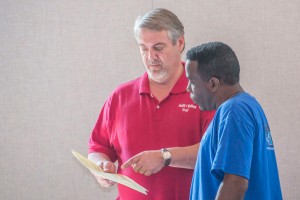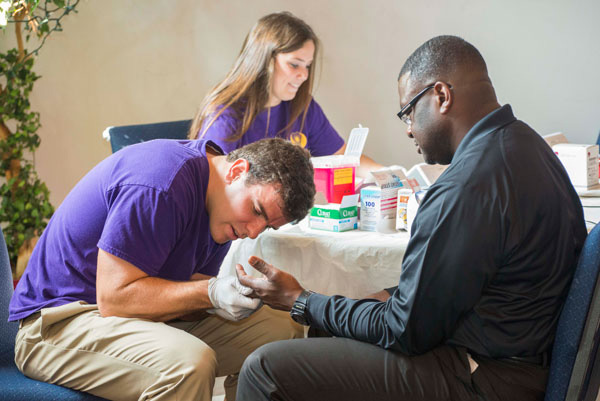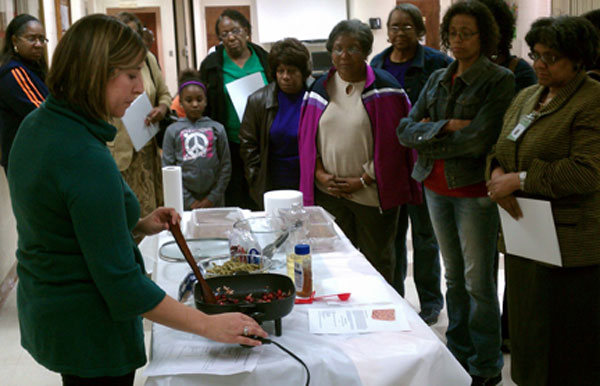Saving Lives Initiative Promotes Health through Tuscaloosa Heart Walk
- March 29th, 2020
- in Saving Lives
For the sixth consecutive year, The University of Alabama’s Saving Lives Initiative participated in the American Heart Association’s (AHA) Tuscaloosa Heart Walk at the Tuscaloosa Amphitheater. The event was held Saturday, March 7. “This is one of the largest groups that has participated in the last past few years,” said Dr. Nicole Prewitt, director of programs and partnership for Community Engagement at UA’s Center for Community-Based Partnerships.
Saving Lives was one of many organizations present to support AHA by promoting heart disease awareness and stroke awareness. More than 100 members of the Saving Lives network participated in the event and the network donated more than $800 to the American Heart Association through the Tuscaloosa Heart Walk.
“Today, we developed stations that highlight health information and promotion, nutrition, and physical activity. We also engaged the community with UA student organizations providing credible health information and healthy snacks for participants,” said Prewitt.
During the AHA opening ceremony, Prewitt was recognized as the recipient of the 2020 Heart of the Community Award for the Saving Lives program’s impact.
“I started to participate in Saving Lives six years ago,” said Sheila Lee from Mount Pilgrim Baptist Church in Tuscaloosa. “The program has just been phenomenal because it has made us aware of our bodies and health. In the church, we think about the health of our spiritual lives, but this program made us aware of our physical health too. It doesn’t only provide us with health information, but also makes us think outside the box about how we can get the information to our congregation and how to work together to promote healthier living.”
Annette Harris, a health advocate from Benville Baptist Church in Cottondale, agreed that this program had influenced her church. “I think it makes a great impact in this community as well as churches. I want to encourage more people to get involved with this work through these events.”
This year, three UA student organizations also joined the Tuscaloosa Heart Walk by partnering with Saving Lives: the National Black MBA Association, Hands in Health, and Alpha Epsilon Delta.
Andre Smithson, a second-year MBA student at The University of Alabama, joined the Heart Walk as a representative from the National Black MBA Association. “I’m here as a representative from National Black, supporting the Heart Walk. I’m here to greet people who are coming in and encourage them to keep having a good time, keep on walking, and stay as positive as they can,” Smithson said. The National Black MBA Association is about encouraging African Americans to get their masses into business and get African Americans in executive roles across multiple organizations. “I think the Heart Walk is a really good opportunity to encourage the black community to be more active and help them reduce heart disease.”
“We are here to talk about ‘MyPlate’ and different helpful nutrition facts,” said Morgan Renfroe, a senior student in Public Health at the table of Hands in Health. “We are also here to promote exercising and healthy eating. Our table is about telling people what types of foods and what proportions they should be eating. We have different plates and different serving sizes set up. We would ask people what they think the nutrition proportion for a healthy diet should be, and then tell them the real proportion. Some people actually asked ‘What is this?’ and when they saw how much the actual proportions should really be, they were sometimes shocked. I think this is a really cool way to connect knowledge with demonstrations.”
Leah Thomas, president of Alpha Epsilon Delta, also introduced their table. “At our table, we have some questions about physical activities and are giving people some knowledge about how much exercise they need to get. Then we let them try a few like doing five jumping jacks or holding a squat for five seconds, and they can win a healthy snack.” Alpha Epsilon Delta is a pre-health honor society that has many pre-med students. “We also have a lot of children coming, so we think it is important to make them see that it can be fun to exercise,” Thomas said.
“I’m really surprised with such a huge level of turnout from the community for the Heart Walk,” said Jamesia Stevenson, a second-year MBA student. Stevenson is also a graduate research assistant under Prewitt. “This is my first time being a part of the Heart Walk. I think that it is such an amazing experience to be involved in a local community event like this and to work with everybody here to promote heart health awareness.”
Saving Lives is under the direction of Dr. Nicole Prewitt, director of programs and partnerships for community engagement at UA’s Center for Community-Based Partnerships, which is an initiative of the Division of Community Affairs.
For more information about the program contact Prewitt at nbprewitt@ua.edu or at (205) 348-9819.
Saving Lives is a faith-based wellness program established by The University of Alabama’s Center for Community-Based Partnerships to advocate for healthy families and communities through faith.


